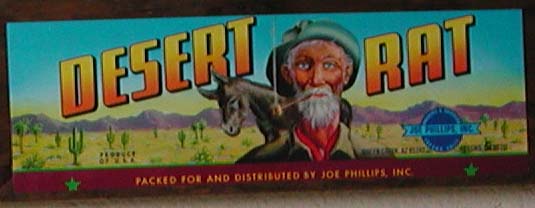
What is a Desert Rat?
|
Your desert rat is basically just another poor bare forked featherless biped, like the rest of us, but he has certain distinguishing features: a permanent squint, a hide well pricked with cactus acupunctures, the big toes all purple and dead from kicking stones, and inside the skull hardly any viable brains left.
The desert rat loves water but prefers to live, like his four-footed cousin the kangaroo rat, where water is rare as uranium. The rarity makes it precious, therefore lovable. For this rat the finest of all music is the tinkle of seep water trickling into a tin cup, the periodic drip of unseen waterdrops falling in the shadows upon tympanic stone.
He is tolerably adapted to intense heat, constant glare, sand in his eggs, scorpions in his shoes, kissing bugs in his bedroll. He doesn't mind a landscape composed mostly of naked rock with some scrubby-looking plants creeping cautiously out of the cracks; in fact he tends to find green pastures and grassy lawns and trees -- especially the fat sort with bushy green foliage -- stifling, even claustrophobic. Which brings us to space, outer-inner space, and the desert rat's special fetishes. He loves all forms of life, even people. But though he loves people (in moderation), he does like to see them, just like trees and bushes, spaced well apart. At a comfortable spitting distance from one another -- say two miles, with a sawtooth hogback monocline about a mile high in between for a fence. This is not meant to suggest that the desert rat is necessarily tougher than other rats. He is certainly not nearly so tough, for example, as the Rattus rattus urbanus, that highly specialized breed that thrives or at least survives on cement and steel, clamor and crime, lethal gasoline fumes and the deadly double dry Martini. Compared to him the desert rat is a delicate, fastidious epicene, tender as a water lily. But the desert rat carries one distinction like a halo: he has learned to love the kind of country that most people find unlovable. Call the desert barren, harsh, bitter, dreary and gloomy, acrid and arid, lifeless, hopeless, ugly as sin, foreboding as the gates of Hell -- he will happily agree with you. Because in his heart lies the secret belief that the awful desert is really sweet and lovable, that the ugly is really beautiful, that Hell is Home. And if others think he's crazy so much the better; he is reluctant to share his love anyway. |
| -- Edward Abbey, Cactus Country |
| (See also) |
| |
|
